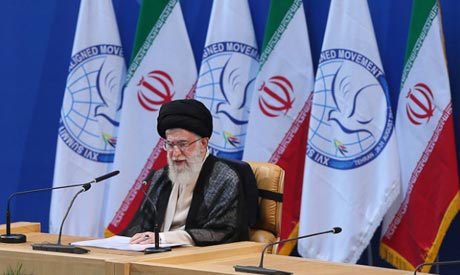
Iran's Supreme Leader Ayatollah Ali Khamenei speaks during the 16th summit of the Non-Aligned Movement in Tehran, August 30, 2012. (Photo: Reuters)
Iran was under increased diplomatic pressure on Friday after an International Atomic Energy Agency report said it was expanding its controversial nuclear programme and had "hampered" the UN watchdog's work.
The report added to criticism of Iran's nuclear stand by UN chief Ban Ki-moon at a two-day Non-Aligned Movement summit in Tehran that was to wrap up on Friday.
Iran's supreme leader Ayatollah Ali Khamenei opened the summit with a speech railing against the United States, the "Zionist wolves" of Israel and the "dictatorship" of the UN Security Council, which are at the forefront of the pressure directed at his country.
He said Iran would "never" cease its nuclear energy activities, regardless of UN and Western sanctions, and insisted that the programme was not aimed at developing nuclear weapons, whose use he called an "unforgiveable sin."
The International Atomic Energy Agency report released late on Thursday -- in the middle of the Tehran summit -- said Iran had doubled its capacity to enrich uranium at its underground Fordo nuclear facility by installing, but not yet switching on, more than 1,000 more centrifuges.
It also said that UN inspectors wanting to see part of a military base in Parchin, outside Tehran, which is suspected of hosting tests of explosives that could be used in a nuclear warhead, had been "significantly hampered" by months of refused access, what looked like intensive scrubbing and scraping at the site, and the use of covers to shield the site from satellite cameras.
A member of Iran's parliamentary national security and foreign policy commission, Hossein Naqavi Hosseini, was quoted by the ISNA news agency as saying that the timing of the report's release was "politically motivated" with the aim of "undermining the summit."
"This report does not raise any points or content but merely repeats the agency's previous claims," he said.
Iran's uranium enrichment, and its Fordo bunker, were two of the key points raised in negotiations this year by the P5+1 -- the UN Security Council's five permanent members plus Germany -- that have all but stalled.
EU foreign policy chief Catherine Ashton, representing the P5+1, is to talk with Iran's chief nuclear negotiator Saeed Jalili "in the coming days," Ashton's spokesman said on Thursday.
Iranian officials have dismissed the UN concerns over their nuclear activities, saying that Parchin was an off-limits military base, that the focus on it was overblown and that suspicions about its atomic programme were based on "false" Western intelligence.
Ban, on his first visit to Iran as UN secretary general, this week told Khamenei and President Mahmoud Ahmadinejad their country needed to take concrete steps to allay international concerns, notably by complying with the IAEA and with UN resolutions.
He warned about bellicose rhetoric from Israel and Iran that has been rising in recent weeks, saying "a war of words can quickly spiral into a war of violence."
In a speech at an Iranian diplomats' college on Thursday, he also warned about the "cost of Iran's current trajectory," saying that "any country at odds with the international community... finds itself isolated from the thrust of common progress."
While the top leaders of Israel -- which is widely believed to possess the Middle East's sole nuclear arsenal -- have given the impression they are poised to launch imminent strikes on Iran, the United States is emphasising diplomacy.
"The window of opportunity to resolve this remains open... but it will not remain open indefinitely," White House spokesman Jay Carney said on Thursday.
The worsening showdown added to other issues overshadowing the NAM summit in Tehran.
A key one has been the hosts' steadfast support for Syrian President Bashar al-Assad in his regime's deadly 18-month conflict with insurgents.
On Thursday, Egypt's new President Mohamed Morsi -- making the first trip to Iran by an Egyptian head of state since the 1979 Islamic revolution -- used the summit to openly voice his support for the Syrian opposition.
The "oppressive" Syrian regime had lost all legitimacy and was confronted with the same pro-democracy rebellions that had swept the Arab world, including Egypt, since 2010, he said, as Ahmadinejad listened stone-faced.
Short link: